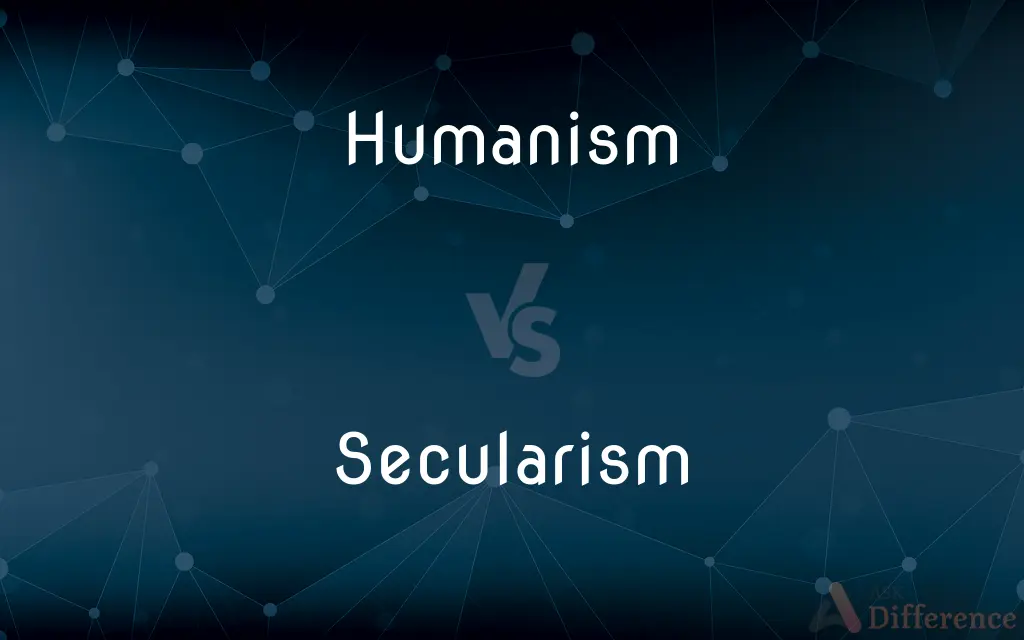Humanism vs. Secularism — What's the Difference?
Edited by Tayyaba Rehman — By Urooj Arif — Published on March 2, 2024
Humanism emphasizes human values and concerns, advocating for human rights and rationality, while secularism focuses on the separation of religious institutions from state affairs, ensuring religious neutrality in public spaces.

Difference Between Humanism and Secularism
Table of Contents
ADVERTISEMENT
Key Differences
Humanism and secularism are philosophical stances that have influenced various aspects of society, culture, and governance. Humanism, rooted in the Renaissance, places a strong emphasis on human values, potentials, and concerns. It advocates for a life stance that seeks to develop human capacities and values through reason, ethics, and justice without necessarily relying on religious doctrines. Humanists often focus on improving human welfare, dignity, and the promotion of human rights.
Secularism, on the other hand, is primarily concerned with maintaining a separation between religion and government. This includes ensuring that public policy and education are free from religious dominance, allowing for freedom of religion and belief for all individuals. Secularism aims to create a society where people of different religious beliefs and those without religious beliefs can coexist equally and impartially under the law.
Humanism and secularism can overlap—many humanists support secularism as a means to ensure freedom and equality—while they are distinct in their primary focuses. Humanism is more concerned with ethical values and the fulfillment of human potential, often incorporating a wide range of cultural, philosophical, and scientific content. Secularism is focused on the political and social structure, ensuring that religious groups do not exert undue influence on public life and governance.
Humanism encourages personal growth and societal progress through human-centered means, often advocating for education, arts, and sciences as ways to enrich human experience and understanding. Secularism, by ensuring a neutral stance on religion in public affairs, supports a pluralistic society where religious and non-religious viewpoints can coexist without one influencing governmental decisions over the other.
In summary, while both humanism and secularism promote values that can lead to a more inclusive and equitable society, humanism does so by emphasizing human potential and ethics, whereas secularism focuses on the separation of religion from state affairs to ensure equal treatment of all citizens regardless of their religious beliefs.
ADVERTISEMENT
Comparison Chart
Core Principle
Emphasis on human values, potential, and dignity
Separation of religion from state affairs
Focus
Ethical living, human rights, rationality
Religious neutrality in public spaces
Objective
Promote human welfare and development
Ensure freedom of religion and belief for all
Philosophical Roots
Renaissance humanism, emphasizing education, arts, and sciences
Enlightenment, focusing on individual liberty and preventing religious dominance in public life
Key Concerns
Improving human capacities, promoting human rights
Preventing religious influence on governance, education, and public policy
Compare with Definitions
Humanism
A philosophy focusing on human values and potential.
Humanism encourages critical thinking and ethical living without reliance on religious doctrines.
Secularism
Advocates for the separation of church and state.
Secularism ensures that government policies are made independently of religious institutions.
Humanism
Advocates for human rights and dignity.
Humanists support global initiatives to enhance education and healthcare.
Secularism
Supports religious neutrality in public affairs.
Secular laws protect the rights of believers and non-believers alike.
Humanism
Emphasizes reason and scientific inquiry.
Humanism values the role of science in advancing human knowledge and welfare.
Secularism
Aims to prevent religious dominance in public life.
Secularism opposes religious symbols in public schools to maintain neutrality.
Humanism
Promotes cultural and artistic expression.
Humanist organizations often support the arts as a means to enrich human experience.
Secularism
Ensures freedom of religion and belief.
Secularist policies allow individuals to practice any religion or none without state interference.
Humanism
Encourages ethical and rational solutions to human problems.
Humanists advocate for policies based on evidence and human needs rather than religious beliefs.
Secularism
Focuses on equal treatment under the law regardless of religious belief.
Secular governments provide the same services and rights to all citizens, irrespective of their faith.
Humanism
A system of thought that focuses on humans and their values, capacities, and worth.
Secularism
Religious skepticism or indifference.
Humanism
Humanism A cultural and intellectual movement of the Renaissance that emphasized human potential to attain excellence and promoted direct study of the literature, art, and civilization of classical Greece and Rome.
Secularism
The view that religious considerations should be excluded from civil affairs or public education.
Humanism
The study of the humanities or the liberal arts; literary (especially classical) scholarship.
Secularism
Neutrality towards all religions.
State secularism
Humanism
The doctrine emphasizing a person's capacity for self-realization through reason; rejects religion and the supernatural
Secularism
The state or quality of being secular; a secular spirit; secularity.
Secularism
A doctrine that rejects religion and religious considerations
Common Curiosities
Why is secularism important in government?
Secularism prevents any single religion from dominating state affairs, ensuring policies and laws are inclusive and equitable for everyone, regardless of their religious affiliation.
Is secularism anti-religious?
Secularism is not anti-religious; it advocates for the separation of religion from state affairs to ensure freedom and equality for all, regardless of religious belief.
Can someone be both a humanist and a secularist?
Yes, many people identify as both humanists and secularists, seeing these philosophies as complementary in promoting a rational, ethical, and inclusive society.
How do humanism and secularism impact education?
Humanism promotes a broad education including arts, sciences, and critical thinking, while secularism ensures education is neutral regarding religious beliefs.
Does humanism reject religion?
Humanism focuses on human values and solutions through reason and does not necessarily reject religion but does not rely on it for ethical and moral guidance.
What role do ethics play in humanism?
Ethics are central to humanism, which advocates for moral principles based on human welfare and happiness, guided by reason and empathy rather than religious doctrine.
How does secularism protect religious minorities?
By ensuring the government does not favor any one religion, secularism protects the rights and freedoms of religious minorities, allowing for a diverse and pluralistic society.
Can secularism coexist with religious societies?
Yes, secularism can coexist in religious societies by allowing people to freely practice their religion while ensuring that government and public policies remain neutral.
Do humanists believe in any form of afterlife?
Humanists typically focus on the here and now, emphasizing the importance of making a positive impact in this life rather than on beliefs in an afterlife.
What is the significance of secularism in pluralistic societies?
In pluralistic societies, secularism is crucial for maintaining peaceful coexistence among diverse religious and non-religious groups, ensuring no group is privileged or marginalized by the state.
Share Your Discovery

Previous Comparison
Google Drive vs. Amazon Cloud Drive
Next Comparison
Fixed Mindset vs. Growth MindsetAuthor Spotlight
Written by
Urooj ArifUrooj is a skilled content writer at Ask Difference, known for her exceptional ability to simplify complex topics into engaging and informative content. With a passion for research and a flair for clear, concise writing, she consistently delivers articles that resonate with our diverse audience.
Edited by
Tayyaba RehmanTayyaba Rehman is a distinguished writer, currently serving as a primary contributor to askdifference.com. As a researcher in semantics and etymology, Tayyaba's passion for the complexity of languages and their distinctions has found a perfect home on the platform. Tayyaba delves into the intricacies of language, distinguishing between commonly confused words and phrases, thereby providing clarity for readers worldwide.













































